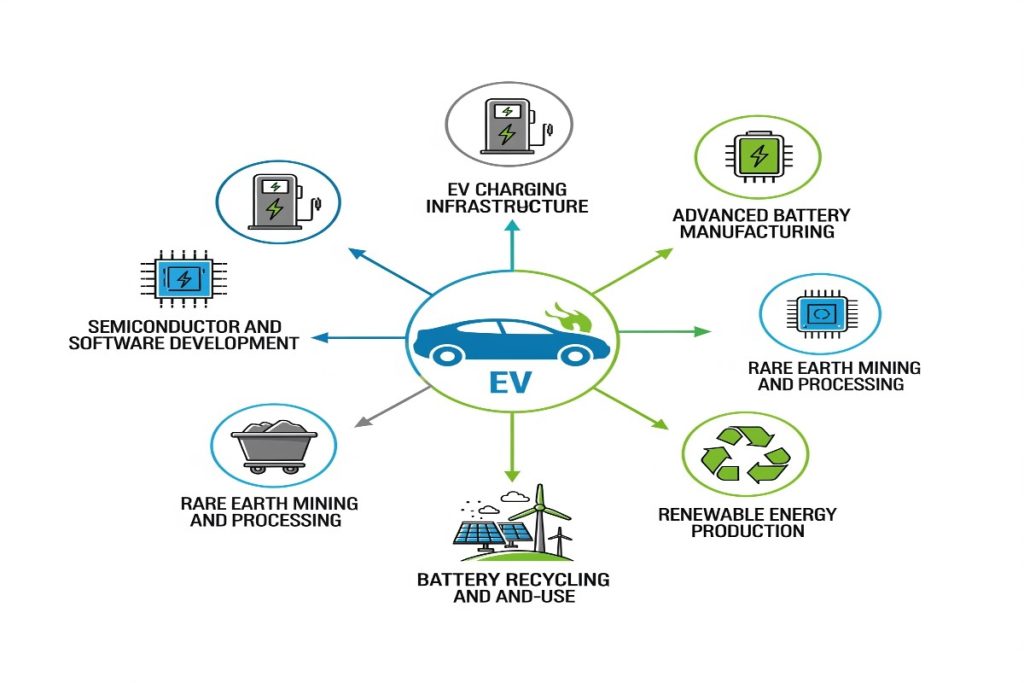Introduction
The worldwide electric vehicle (EV) boom is here, not just a forecast. The transition from internal combustion engines to electric vehicles (EVs) is reshaping entire industries, marking the dawn of the EV Era, as consumers, governments, and businesses strive for smarter, greener mobility. However, automakers like Tesla and BYD are not the only players in this transformation. To satisfy new demands and seize new opportunities, entire industries are changing, from fleet management and logistics to battery manufacture. What sectors are prospering in this EV era, and how are businesses setting themselves up for long-term gains? Let’s dissect it. Why the EV Boom Is Reshaping Global Industries
EVs have gained prominence due to a number of factors:
Over the next ten to twenty years, governments over the world are enacting laws prohibiting fossil fuel-powered vehicles and imposing higher pollution limits.
- The desire from consumers for smarter, greener cars is rapidly increasing.
- Battery costs continue to decrease as battery performance improves.
- Infrastructure for charging is growing rapidly.
All of this contributes to a multi-trillion-dollar change that affects manufacturing, supply chains, technology, and energy. The takeaway for companies is straightforward: either embrace the EV ecosystem or risk falling behind.
Battery Manufacturing: The Heart of the EV Revolution
Batteries are the essential core of every electric vehicle. The demand for lithium-ion batteries is projected to increase threefold by 2030, making battery production one of the fastest-expanding industries worldwide.
Major companies such as CATL, Panasonic, and LG Energy Solution are increasing their gigafactory operations. At the same time, startups are competing to create next-generation batteries consider solid-state technology which offer quicker charging and extended ranges.
Mining firms providing essential raw materials (lithium, nickel, cobalt) are likewise prospering. Numerous conventional energy firms are shifting towards battery supply chains to ensure their businesses remain viable in the future.
Charging Infrastructure: Powering Up New Opportunities
Without easily accessible charging, there can be no EV revolution. As a result, the charging infrastructure sector is expanding.
Public fast-charging networks are receiving billions of dollars from companies like Shell, ChargePoint, and Ionity Real estate developers are often adding charging stations to residences and offices.
Startups are developing battery-swapping stations, wireless charging, and portable chargers for delivery trucks and fleets. For contractors and company owners, installing and maintaining charging stations is a whole new market.

Automotive Suppliers & New-Age OEMs
The whole automotive supply chain is altered by the shift to electric vehicles.Conventional providers of combustion engine components need to adapt or face obsolescence.
Currently, many individuals are focusing on:
- Electric propulsion systems
- Lightweight components for improved battery performance.
- Cutting-edge electronic and sensor technologies
At the same time, emerging original equipment manufacturers (OEMs) such as Rivian, Lucid Motors, and Nio are competing against traditional brands with innovative designs and consumer-direct strategies. This rivalry drives innovation, compels established players to adjust more quickly, and maintains a lively supply chain.
Logistics & Fleet Management: New Models Emerging
Delivery companies, ride-sharing services, and fleet operators are early adopters of EVs. Switching to electric fleets cuts fuel costs, meets sustainability goals, and aligns with consumer expectations for greener service.
New fleet management models are popping up:
- Subscription services for electric trucks and vans.
- Battery-as-a-service models that reduce upfront costs.
- Smart fleet software that optimizes charging, route planning, and maintenance.
Plans for thousands of electric delivery vans have been revealed by logistics behemoths including FedEx and Amazon. Startups in this space offer everything from fleet financing to charging solutions creating new ecosystems of services around the EV boom.
Real Examples: Companies Winning Big in the EV Era
- Tesla: More than just car sales, Tesla’s battery technology, energy storage, and Supercharger infrastructure position it at the core of various value chains.
- BYD: The Chinese powerhouse has emerged as a worldwide EV frontrunner and a leading battery provider for various brands.
- ChargePoint and Blink Charging: Two prominent public charging firms growing their networks in the US and Europe.
- CATL: Currently among the biggest battery manufacturers in the world, energizing not only vehicles but also energy storage initiatives.
- Legacy Automakers: Ford and GM have invested billions to transition their fleets to electric and create new battery supply chains.
Conclusion
The EV era is an industrial revolution that affects mining, battery manufacturing, charging networks, software, fleet management, and clean energy. It is much more than just automobiles.Businesses that invest in supporting ecosystems, form strategic alliances, and adjust swiftly will prosper. People who stick to outdated paradigms run the risk of falling behind.
This opens up a wide range of new employment options for companies and professionals, including smart fleet managers, charging network designers, and battery engineers. It is simpler for qualified individuals to locate jobs in the growing EV ecosystem thanks to platforms like Wiraa, which links remote talent worldwide.In the upcoming ten years, the electric car sector may be your best option if you’re searching for expansion, innovation, and sustainability.




